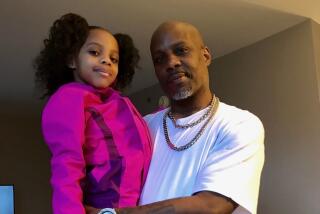Review: Blind Melon’s late lead singer Shannon Hoon tells his story in new documentary
The curse of self-awareness is sown throughout the documentary “All I Can Say,” a kaleidoscopic video diary recorded by Blind Melon singer Shannon Hoon from his arrival in Los Angeles in 1990 to the hours prior to his fatal 1995 cocaine overdose in New Orleans.
Hoon, a Lafayette, Ind., native, obsessively recorded everything, from the mundanity of empty hotel rooms, answering-machine messages and brushing his teeth to more significant events, including Blind Melon signing a large 1991 recording contract atop the Capitol Records building in Hollywood and the birth of his daughter just months before his death.
The camera was his companion, confessional, surveillance tool, and sometimes even a weapon of passive aggression. It also served as a means of absorbing the onslaught of experiences as he went from aspiring musician to international rock star.
At one point, he explains to an unseen interviewer who asks whether there is time to reflect, “That’s why I’ve got a video camera. There’s so much happening right now I can’t really sit back and soak it all in. I’ll just watch it later. Little pieces of time I’ll never get back.”
The videos are raw and revealing. Hoon could be charming, playful and intelligent. His reverence for Neil Young, the Beatles and the Rolling Stones is endearing. He was a fanboy.
He could also be a jerk. He didn’t always treat Lisa Crouse, his longtime girlfriend (and mother-to-be of his child), or his bandmates well. He had numerous encounters with the law including an arrest for indecent exposure after he disrobed onstage and urinated on a fan at a show in Vancouver. But he is never less than passionate about making music or performing.
The attendant fame appears to be the price Hoon felt he had to endure in order to write and perform his songs. But the video camera allowed him to shape his view of the world. He likely did not anticipate the videos going public, yet much of what Hoon shot presages contemporary social media. It’s not hard to imagine some of this as Instagram posts or on TikTok.
Hoon appeared to be constantly trying to outrun other people’s impressions of him. “Hey, you’re the dude in the Guns N’ Roses video!” (He sang backing vocals and appeared in the 1991 clip “Don’t Cry”; fellow Hoosier Axl Rose was also from Lafayette.) He also wanted to be known for creating a broader palette of songs than the simple “find your tribe” message of Blind Melon’s breakthrough hit “No Rain” and its accompanying “bee girl” video.
Meticulously assembled from 250 hours of archived footage by Danny Clinch, Taryn Gould and Colleen Hennessy (the trio are credited as directors along with Hoon), the film initially feels fragmented, like viewing a portrait through shattered glass. But as it progresses, the arc of a tragically short life takes shape, and we witness the upward slope as well as the downward spiral.
That Hoon lived such a prototypically rock ‘n’ roll lifestyle, while simultaneously commenting on it — he notes his first broken hotel room mirror — is fascinating. And heartbreaking.
His acknowledgement of the self-destructive behavior, especially with drugs and alcohol, the recognition of his family history, his penchant for taping TV news of the untimely deaths of notable musicians such as Kurt Cobain (only seven months older than Hoon) and Jerry Garcia all add a layer of foreboding that goes beyond the fact that we know how this ends.
It’s these moments of introspection that set “All I Can Say” apart from typical rock docs. While Blind Melon is primarily remembered for their promising debut album and disappointing follow-up, “Soup,” the film is not likely to change your assessment of the band. But Clinch, Gould and Hennessy do right by Hoon in telling his story and giving him the final say.
‘All I Can Say’
Not rated
Running time: 1 hour, 42 minutes
Playing: Available June 26 via virtual cinemas, including Laemmle Theaters and the Frida Cinema
More to Read
Only good movies
Get the Indie Focus newsletter, Mark Olsen's weekly guide to the world of cinema.
You may occasionally receive promotional content from the Los Angeles Times.









